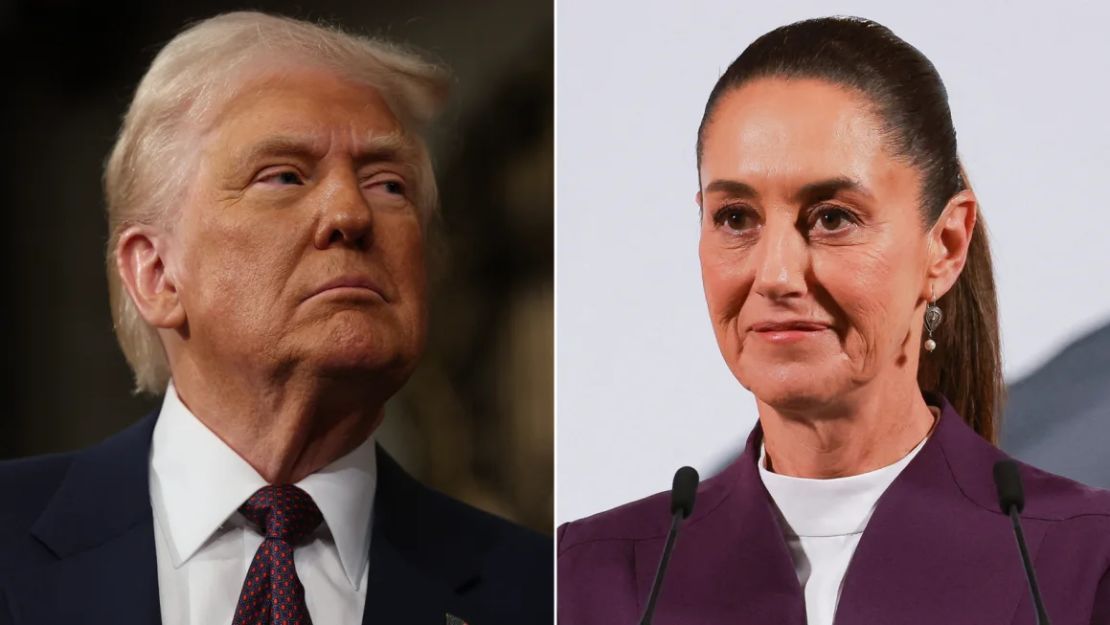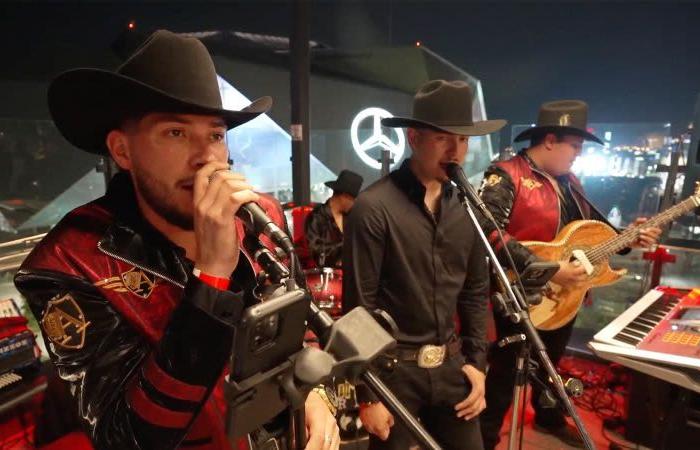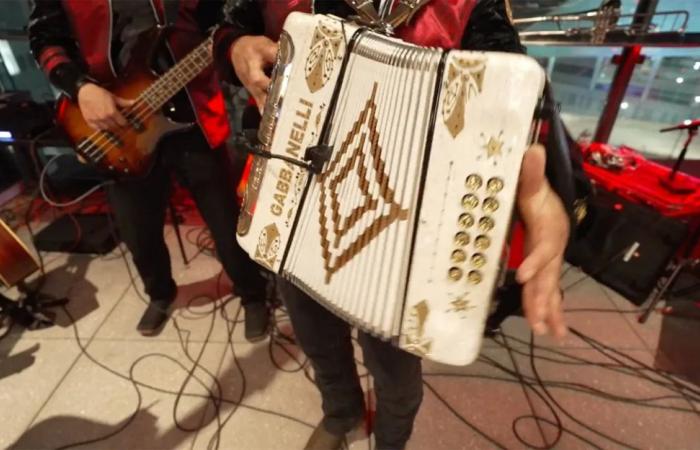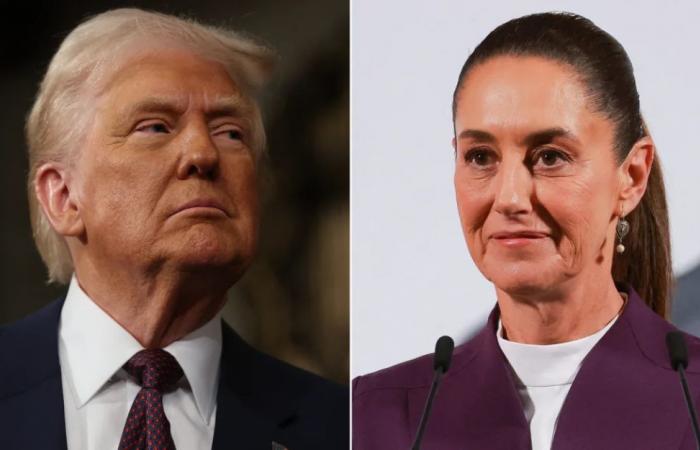CNN —
It is Saturday night in a bar of a roof of the center of Atlanta, and the Active Order group is about to play a Mexican ballad.
What seemed like a shy and reserved audience suddenly transforms when the initial chords of the trotonous Polca begin. The public stands and sings in Spanish while the dance floor dissolves in a sea of cowboy hats:
I am the Lord of the Gallos
The one of the Jalisco cartel
I have fighting roosters
That fight for my party
With its soft head movements, its matching leather jackets and its complicit smiles, their performance barely provokes controversy, or at least not for the casual observer.
However, last month, a group that sang the same song – “that of the Palenque – was prohibited from entering the United States to an unprecedented measure that, according to critics, raises worrying issues about freedom of expression in the country.
Your transgression, according to the State Department? “Glorify (to a) drug boss.”
The song is a narcocorrido: a ballad on the submundo of drug trafficking. The group that composed it, the cheerful of the ravine, got into a good mess with the US and Mexican authorities when he played the song in the Mexican city of Zapopan, in Jalisco.
That performance, in which the group sang on the exploits of El Mencho, the leader of the Jalisco Nueva Generación cartel, in front of his portrait in cartoon, not only put an end to the band’s plans to make a tour of the United States, but made them the object of a criminal investigation in their own country.
As one of the six Mexican drug cartels that the Trump administration has declared foreign terrorist organizations, the Jalisco cartel is located in the center of the growing tensions between Mexico and the United States for cross -border crime. The authorities of both countries took measures when the concert video was viralized.
The place where the cheerful of the ravine acted quickly; The Jalisco Prosecutor’s Office promised to investigate; And the president of Mexico, Claudia Sheinbaum, warned that the group could have violated the law. The US Department of State withdrew the visa.
“The last thing we need is a welcome carpet for people who extol criminals and terrorists,” said the Undersecretary of State, Christopher Landau, in an X publication. “In the Trump administration, we take our responsibility for the access of foreigners to our country seriously,” he added. The band apologized on Facebook the next day.
Although the songs about drug trafficking have been censored occasionally in Mexico for years, observers say that the growing pressure of the Trump administration to take drastic measures against cartels has fed a new wave of prohibitions to the public interpretation of narcocorridos in several Mexican states. Even more worrying, they say, they are the signs that Mexican bands are beginning to self -censure for fear that bothering US authorities can compromise their ability to tours.
It is the first time that the State Department punishes a Mexican group, according to Elijah Wald, author of a gender guide in English. Some critics paint it as the last measure against Mexico of the Trump administration, which has already tensioned ties with its energetic measures against immigration and its tariff policies.
“(These bands) have been saved so far because of the fact that no one spoke Spanish,” Wald said. “And when I say ‘nobody’, I mean people who are imposing this type of nonsense. Obviously, the revocation of visas has very little to do with the songs. It has to do with a policy of revocation of visas.”
Asked about the cheerful of the ravine, the State Department told CNN that they could not talk about individual cases.
The sanction of the State Department may have ruined the joy of the Barranco by the US, but has not made a dent in the popularity of the group or gender. In any case, he has given both impulse.
Billboard figures show that the group has achieved more than 2 million new listeners in streaming services, proof, if any, of the enduring modern attraction of a genre rooted in folk music of the nineteenth century, which for a long time has idealized outlaws, marginalized and homeless.
The first runs or ballads celebrated the exploits of “Famous, general bandits, sometimes horses, sometimes also fighting roosters”, according to Sam Quinones, a writer who covers music and drug trafficking in Mexico and California.
“It was almost like a musical newspaper,” said Quinones. “It became a very deep -rooted genre of popular music.”
During the Dry Law in the 1920s, a new subgenre – the narcocorrido – arose to tell the stories of those who smuggled illegal alcohol from Mexico to the United States, the author Wald explained.
A century later, that subgenre is still booming. The most popular music artist among American users in 2023 was not Taylor Swift, but the narcocorridos singer weight weight.

But experts claim that there was a cultural change when drug traffickers began to pay the musicians to write songs about themselves in the mid -1980s, when the legendary “King of the Corridos” Chalino Sánchez began accepting orders.
“It was not necessarily the first, but the key figure of that change, which significantly modified the business economy,” Wald said. “It meant that anyone with money could commission a praiseful run.”
Since then, many singers and groups “have been sponsored or acted for specific figures in the world of narco, and it is thought that they are aligned with certain cartels,” said Wald, which leads to a situation that is “definitely dangerous for artists.”
An example: Chalino Sánchez died shots after a concert in Sinaloa in 1992. His murder is still unresolved.
Some fans, such as quinons – who are writing a biography of Sánchez – criticize this change.
“The Corrido used to deal with a simple man who faced power, knowing that he was convicted, knowing that he was going to die and fighting anyway,” says Quinones. “It was corrupted, in my opinion, when it became a praise to power, in a praise to these bloodthirsty men with enormous power that killed meaninglessly.”
Others, however, reject the idea that narcocorridos foster the violence and crime they portray, comparing them with the gangster rap, video games or films such as “the godfather.”
“People say: ‘Oh, parents, don’t let their children play Call of Duty, or will become an armed attacker,” says Ray Maniccias, a 19 -year -old guitarist who appeared after active order in the Atlanta concert.
“I think that is the way they are seeing (narcocorridos) too. They think that if all these boys keep listening to them, they will be influenced by them and will begin to do it. But after all, the way you grow is that of your parents. No music will change that.”
Noel Flores, one of the two active order singers, points out that the authorities trying to ban narcocorridos to run the risk of shooting on the foot.
“That will only make people want more,” says Flores.

Canceling the runs
While some Mexican states have tried to prohibit songs, and the US Department of State to its singers, the president of Mexico, Sheinbaum, has adopted a softer approach, discarding a nationwide prohibition and proposing instead that the government promotes music about peace and love as an alternative, a position that has caused some teasing.
“He is trying to sponsor pleasant music for people to listen to it, which is charming,” Wald said. “But no, that will not work.”
Of course, if the authorities do not find an exit to the debate, they will not only lose the bands, also fans, both in Mexico and in the United States.
“With everything that is happening with (Trump), as Mexican, canceling corridos makes us feel ‘less’,” said Emmanuel González, who attended the concert in Atlanta.
Other fans have been more unruly with the idea of canceling runs.
When singer Luis R. Conríquez refused to play drug -related music in a concert held in April in Texcoco, in the State of Mexico, claiming a local prohibition, he told the public that he boo: “There are no run tonight. Are we going home?”
They responded by destroying the stage. (Conríquez then defended his decision, saying that “he must follow the new rules that the Government has established with respect to the runs”).
Oswaldo Zavala, professor of literature and expert in narcocultura, affirms that many musicians self -censure not by deference to the Mexican authorities, but “in response to the presidency of Donald Trump … the fear that (Trump) can revoke the visas that allow them to act and produce their music in the United States.”
A few days after his concert in Atlanta, Order Activa published a video of his performance with the legend: “Let’s see if they do not take away our visa. They are not believed to be a joke.”
Even so, in the midst of fears, there are those who comfort themselves with the irony that bringing a form of music to hiding that has always celebrated outlaws will probably only make it more popular.
As Violet Uesti says, another of the concert attendees in Atlanta: “I like the atmosphere. I like how people unite. If they prohibit it, we will continue listening to it.”









